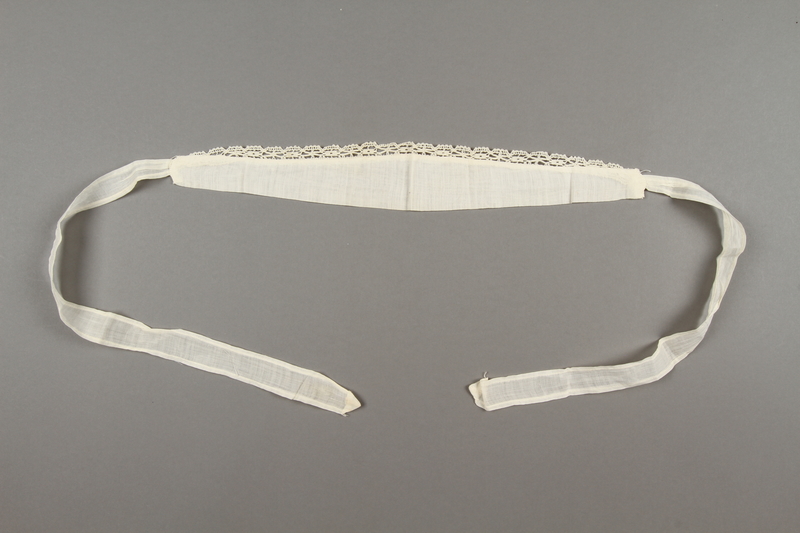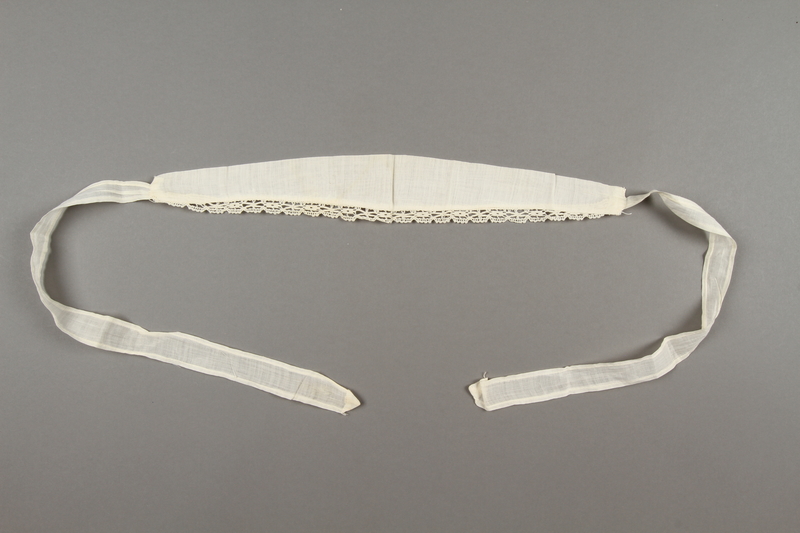Overview
- Brief Narrative
- Uniform headband belonging to a maid employed by Livia Brust (later Lilly Brust Gach) before and during World War II (1939-1945) in Hungary. Livia was living in Budapest, Hungary, with her husband, Elek, and their daughter, Eva, when Hungary joined the German-led Axis Alliance in November 1940. Elek was a prominent member of the Jewish community in Budapest and a prosperous manufacturer. Beginning in late 1940, Jewish males were required to do forced labor service and Elek was sent to a labor camp. Livia managed the business while he was gone, and eventually obtained his release with black market papers. In 1943, Elek was conscripted again, and not released until March 1944. Later that month, German troops marched into Budapest. German authorities severely restricted Jewish life, and began deporting Hungarian Jews. In late August, Livia, Elek, and Eva obtained Swedish protective passes from Raoul Wallenberg. However, in October, they decided it was safer to go into hiding. They stayed in several places in the city, even as Soviet bombardment increased and there were power outages and food shortages. Eventually, they joined a family friend in the countryside. They hid in many places there, and were in the town of Érd when Budapest was liberated in February 1945. Most of Livia and Elek's family members perished. As Soviet control of postwar Hungary increased, the Brust family decided to leave. They sailed from England on May 27, 1947, and settled in New York City, where Livia's parents and brother had relocated in 1939 and 1941, respectively.
- Date
-
use:
approximately 1933-1944
- Geography
-
use:
Budapest (Hungary)
use: United States
- Credit Line
- United States Holocaust Memorial Museum Collection, Gift of Eva Brust Cooper
- Contributor
-
Subject:
Lilly Brust Gach
Previous owner: Lilly Brust Gach
- Biography
-
Livia Schwarcz (later Lilly Brust Gach, 1912-2001) was born in Budapest, Hungary, to Adolf (1880-1959) and Szeren (Serena, nee Deutsch, 1889-1942) Schwarcz. Livia had a younger brother, Laszlo (later Leslie Shaw, 1915-1990). Her father, Adolf, and his business partner and brother-in-law, Ödön Vogel (Edmond, 1883-1944), ran a wholesale business representing the Swiss Movado Watch Company in Hungary. On June 4, 1933, Livia married Elek Brust (1899-1957), who owned a wholesale paper company. He was born in Budapest, to Bela (1878-1943) and Roza Orova Brust. Livia, Elek, and their parents were university-educated, affluent, and assimilated. They spoke Hungarian, German, English, and French. Livia and Elek had a daughter, Eva (later Cooper, b. 1934), lived in a large apartment in Pest, and employed several staff members in their home. They attended the Dohány Street Synagogue. Livia's large, extended family was close-knit, and gathered regularly for holidays.
Starting in 1938, Hungary began passing anti-Jewish laws modeled after Germany’s Nuremberg laws from 1935, which defined Jews in racial terms. They excluded them from various professions, restricted their opportunities in economic life, and stripped them of equal citizenship status. In April 1939, Livia’s parents, Adolf and Szeren, visited the World’s Fair in the United States. Adolf was concerned about the aggressive actions being taken by Germany, and secretly made plans to reestablish his business in the US. He did confide in Livia and Elek, as an unsuccessful attempt to convince them to immigrate as well. Livia and Elek believed the danger would pass, and they did not want to leave. Germany and the Soviet Union invaded Poland in September 1939, beginning World War II (1939-1945), and Hungary joined the German-led Axis Alliance on November 20, 1940. Soon thereafter, Elek was conscripted into a Hungarian forced labor camp, leaving Livia to run the business while he was gone. After several months, Livia secured his release using papers acquired on the black market.
In June 1941, the Hungarian Army joined Germany’s attack on the Soviet Union. In August, Livia’s brother, Laszlo, left to join his parents in New York. On November 3, 1942, Livia’s mother, Szeren, died of cancer. In 1943, Elek was drafted into forced labor service again, and remained there until early March 1944. Following Germany’s defeat by the Soviet Union, at the Battle of Stalingrad in 1943, Hungary attempted to negotiate an armistice with the Allied powers. In response, German forces occupied Hungary on March 19, 1944. German authorities severely restricted Jewish life in Budapest, and Elek’s business was among those confiscated and Aryanized. In April, Jews were ordered to wear Star of David badges. The following month, in mid-May, the Hungarian and German authorities began to systematically deport Hungarian Jews. Most of the nearly 440,000 Jews, likely including Elek’s parents and extended family members, were deported to Auschwitz concentration camp in German-occupied Poland. By the end of July 1944, the deportations had been so thorough that only the Jewish community in Budapest remained.
In summer 1944, the authorities in Budapest segregated Jews, requiring that they live only in Jewish buildings marked with yellow Stars of David. Elek used his connections to have their building declared a “yellow star” building. They were allowed to occupy only one room of their home, but were able to have family friends occupy the other rooms. A strict curfew prevented Jews from moving around freely outside during certain hours. Jewish families were forbidden from employing others, so Livia and Elek had to let their servants go. Livia quickly learned how to cook, do laundry, and mend clothing. In late August, a German neighbor suggested that they leverage Elek’s Swedish business contacts to apply for protective papers from the Swedish legation. On August 24, Elek, Livia, and Eva each received a Schutz-Pass (protective pass), initialed by Raoul Wallenberg. Livia and Eva also attended classes to convert to Catholicism, and had papers to document the conversion. They often listened to a small radio they had managed to hide from confiscation, so they knew a little about the concentration camps from BBC reports. When Livia received a postcard from her cousin, István, describing time at a lake, Elek explained that it was really sent from Auschwitz. They tried to warn their friends and family, but no one believed that the camps were real.
On October 17, 1944, a coup by the fascist Arrow Cross Party led to the deportation of the remaining Jews to concentration camps. To avoid this, the Brust family went into hiding with non-Jewish friends. They then went to a Swedish safe house, but left quickly due to crowding. They went to an apartment building they used to own, and the building manager, Joseph, let them stay in the basement and brought food. Later, Joseph hid the Brust family in the apartment of a traveling couple. In late November, the remaining Jews in Budapest were forced into a closed ghetto. The Arrow Cross regularly removed groups of Jews from the ghetto and shot them along the banks of the Danube River. By December 1944, Budapest was under constant bombardment from Soviet forces, there was no electricity, gas, or water, and food was scarce. As the Red Army approached, a former employee of Livia’s father came and invited the family to join them at a home in the mountains. While they were there, a group of Soviet soldiers arrived and began to threaten them until the former employee demonstrated that he could translate. The soldiers decided to protect him and his group. Later on, the Soviets took the group to a town where they were almost killed in a firing line over a misunderstanding. Livia’s family left the town, hid on a few farms, and were in Soviet-controlled Érd when Budapest was liberated on February 13, 1945. Most of Livia’s extended family and Elek’s family members perished at Auschwitz, or were shot beside the Danube.
The Brusts returned to Budapest, and found the glass blown-out of the windows in their apartment, but that it was otherwise habitable. Most of their belongings had been stolen, but some money was still safely hidden. Livia briefly reopened her father’s watch business, and Elek restarted his own business. Adolf often sent care packages to Livia so she had access to extra food and everyday goods. To earn extra cash, Livia sold whatever they did not need. As Soviet communist control over Hungary tightened, and new restrictions were put in place, Livia and Elek decided to leave Budapest. In May 1947, they boarded a Cunard liner, Mauretania, in England, and immigrated to the US. They arrived in New York City on May 27, met by Livia’s brother Laszlo, who had Americanized his name to Leslie Shaw, and married a woman named Eleanor. During the war, Laszlo had fought in the US Army in Africa, Italy, and on the Swiss border as a Staff Sergeant with the 5th Army. Livia and Elek settled near her father, and Elek went to work for him. Livia began using her nickname, Lilly, most of the time. Eva completed school, became a teacher, and later earned a Master’s degree in special education. Lilly later reconnected with her cousin, István Vogel (later Steven, 1922-2012), who survived Auschwitz. In 1955, Eva married Elihu Turgell (1930-?), and had a daughter. Elek, died in 1957. Lilly married William Bela Gach (born Bela Gacs, 1905-1999), a Hungarian survivor of several concentration camps, in 1961. Eva divorced, and married Leslie Cooper (born Laszlo Cohn ) in 1979.
Physical Details
- Classification
-
Dress Accessories
- Category
-
Headgear
- Object Type
-
Headbands (lcsh)
- Genre/Form
- Hair ornaments.
- Physical Description
- Long, off-white headband or maid’s cap made of thin, lightweight woven cloth and trimmed with decorative, crocheted lace. The band’s body is formed from a single piece of cloth folded in half along the bottom, and neatly hemmed along the top with off-white thread that also secures the lace trim. The body has slightly curved edges, a wide center, and tapers to rounded ends. A narrow cloth tie that is approximately 15-inches long is stitched into each end of the band. The upper edge of the band is trimmed with decorative, off-white crocheted lace with a floral pattern and a scalloped edge. There is faint, brown staining throughout.
- Dimensions
- overall: Height: 2.000 inches (5.08 cm) | Width: 44.000 inches (111.76 cm)
- Materials
- overall : cloth, thread
Rights & Restrictions
- Conditions on Access
- No restrictions on access
- Conditions on Use
- No restrictions on use
Keywords & Subjects
- Topical Term
- Forced labor--Hungary--Biography. Hidden children (Holocaust)--Hungary--Budapest--Biography. Holocaust, Jewish (1939-1945)--Hungary--Personal narratives, Jewish. Jewish children in the Holocaust--Hungary--Budapest--Biography. Jewish refugees--United States--Biography. Jews--Persecution--Hungary--Biography. World War, 1939-1945--Conscript labor--Hungary--Personal narratives, Jewish. World War, 1939-1945--Jews--Hungary--Budapest--Personal narratives, Jewish. Budapest (Hungary)--History--Siege, 1945.
- Geographic Name
- Budapest (Hungary) Érd (Hungary) United States.
Administrative Notes
- Legal Status
- Permanent Collection
- Provenance
- The headband was donated to the United States Holocaust Memorial Museum in 2018, by Eva Brust Cooper, the daughter of Lilly Brust Gach.
- Record last modified:
- 2023-03-02 09:33:28
- This page:
- https://collections.ushmm.org/search/catalog/irn627361
Also in Brust family collection
The collection consists of clothing, documents, photographs, and portraits related to the experiences of Livia, Elek, and Eva Brust, their family, and the Vogel and Schwarcz families in Hungary and the United States, before, during, and after the Holocaust.
Date: 1914-1994
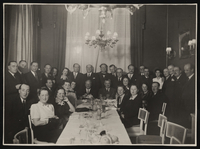
Brust family papers
Document
The Brust family papers document the wartime and post-war experiences of Elek Brust, Livia Brust, and their daughter Eva Brust in Hungary and later the United States. The papers contain correspondence, identification and immigration papers, restitution paperwork, family photographs, and Eva’s poesie book / autograph book. Biographical materials include identification documents, immigration documents and restitution paperwork. Items of note include two membership identification cards for the Dohány-utcai templomi (Dohany Street temple), 1935; identification papers for Elek Brust, 1941-1944; copy of death certificate for Szereu (Serena) Schwarcz, 1942; three Schutz-passes for the Brust family initiated by Raoul Wllenberg, August 24, 1994; two certificates issued by the Swedish embassy exempting Lilly and Eva Brust from wearing the yellow star, August 24, 1944; a transfer ticket for Elek and Eva Brust, 1944; a certificate of release for Elek Brust, September 22, 1944; reissued birth certificates for Elek Brust and Eva Brust, 1946; applications for nonimmigrant visas for Elek, Livia, and Eva Brust, May 19, 1947; Elek Brust’s United States declaration of intention, May 2, 1952; naturalization certificate for Elek Brust, 1953; copy of two death certificates: Elek Brust, February 1, 1957, and Adolf Schwarcz, March 31, 1959; an inventory of Brust family household goods, undated; and restitution paperwork for the Brust family, 1961,1993-1994. The correspondence series includes letters and postcards written in Hungarian by Elek Brust to his wife Livia Brust, 1933-1942; postcards; and letters relating to immigration, passports, and property in Hungary, 1946-1955. The financial materials series includes a bank deposit book, 1938-1944. A drawing of the Brust family bookplate is also include among the papers. The printed materials series include a newspaper clipping; segments of three unknown songbooks, undated; the passenger list of the R.M.S. Mauretania, May 21, 1947; and the 82nd Congress, 1st Session H. Con. Res. 145 document dated July 26, 1951, which grants the status of permanent resident of the United States to the Brust family. The Brust family photographs include photographs of the Elek, Livia, and Eva Brust in Hungary, as well as various unidentified friends and family members, 1914-1951, bulk dates circa 1930s-1940s. Images of the grave of Béla Brust, an unidentified grave yard, and a rubble filled street are also included. Eva Brust’s poesie book, 1942-1946, includes entries from friends and family members including Elek Brust, Eva Brust, Terez Pimler, Penter Panczno, Istvan Vogel, Geza Fischer, Rozsi Fischer, Marta Deutsch, Oskar Deutsch, Istvan Deutsch, Gyula Falkai, Gloria Hidveghy, Eva Penres, Eva Szerres, Panni Deveny, Edit Veres, Judith Szilagyi, and Zsuzsa Urbach.
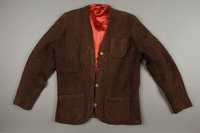
Knit cardigan with decorative buttons and lining owned by a Hungarian Jewish woman
Object
Knit cardigan with novelty buttons used by Livia Brust (later Lilly Brust Gach) during World War II (1939-1945) in Hungary. Livia was living in Budapest, Hungary, with her husband, Elek, and their daughter, Eva, when Hungary joined the German-led Axis Alliance in November 1940. Elek was a prominent member of the Jewish community in Budapest and a prosperous manufacturer. Beginning in late 1940, Jewish males were required to do forced labor service and Elek was sent to a labor camp. Livia managed the business while he was gone, and eventually obtained his release with black market papers. In 1943, Elek was conscripted again, and not released until March 1944. Later that month, German troops marched into Budapest. German authorities severely restricted Jewish life, and began deporting Hungarian Jews. In late August, Livia, Elek, and Eva obtained Swedish protective passes from Raoul Wallenberg. However, in October, they decided it was safer to go into hiding. They stayed in several places in the city, even as Soviet bombardment increased and there were power outages and food shortages. Eventually, they joined a family friend in the countryside. They hid in many places there, and were in the town of Érd when Budapest was liberated in February 1945. Most of Livia and Elek's family members perished. As Soviet control of postwar Hungary increased, the Brust family decided to leave. They sailed from England on May 27, 1947, and settled in New York City, where Livia's parents and brother had relocated in 1939 and 1941, respectively.
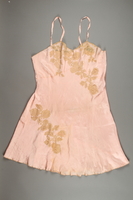
Pink chemise with corded, floral lace appliques owned by a Hungarian Jewish woman
Object
Chemise with corded lace appliques used by Livia Brust (later Lilly Brust Gach) during World War II (1939-1945) in Hungary. Livia was living in Budapest, Hungary, with her husband, Elek, and their daughter, Eva, when Hungary joined the German-led Axis Alliance in November 1940. Elek was a prominent member of the Jewish community in Budapest and a prosperous manufacturer. Beginning in late 1940, Jewish males were required to do forced labor service and Elek was sent to a labor camp. Livia managed the business while he was gone, and eventually obtained his release with black market papers. In 1943, Elek was conscripted again, and not released until March 1944. Later that month, German troops marched into Budapest. German authorities severely restricted Jewish life, and began deporting Hungarian Jews. In late August, Livia, Elek, and Eva obtained Swedish protective passes from Raoul Wallenberg. However, in October, they decided it was safer to go into hiding. They stayed in several places in the city, even as Soviet bombardment increased and there were power outages and food shortages. Eventually, they joined a family friend in the countryside. They hid in many places there, and were in the town of Érd when Budapest was liberated in February 1945. Most of Livia and Elek's family members perished. As Soviet control of postwar Hungary increased, the Brust family decided to leave. They sailed from England on May 27, 1947, and settled in New York City, where Livia's parents and brother had relocated in 1939 and 1941, respectively.
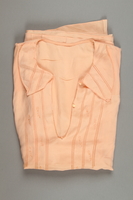
Peach nightgown decorated with embroidery owned by a Hungarian Jewish woman
Object
Nightgown with decorative embroidery used by Livia Brust (later Lilly Brust Gach) during World War II (1939-1945) in Hungary. Livia was living in Budapest, Hungary, with her husband, Elek, and their daughter, Eva, when Hungary joined the German-led Axis Alliance in November 1940. Elek was a prominent member of the Jewish community in Budapest and a prosperous manufacturer. Beginning in late 1940, Jewish males were required to do forced labor service and Elek was sent to a labor camp. Livia managed the business while he was gone, and eventually obtained his release with black market papers. In 1943, Elek was conscripted again, and not released until March 1944. Later that month, German troops marched into Budapest. German authorities severely restricted Jewish life, and began deporting Hungarian Jews. In late August, Livia, Elek, and Eva obtained Swedish protective passes from Raoul Wallenberg. However, in October, they decided it was safer to go into hiding. They stayed in several places in the city, even as Soviet bombardment increased and there were power outages and food shortages. Eventually, they joined a family friend in the countryside. They hid in many places there, and were in the town of Érd when Budapest was liberated in February 1945. Most of Livia and Elek's family members perished. As Soviet control of postwar Hungary increased, the Brust family decided to leave. They sailed from England on May 27, 1947, and settled in New York City, where Livia's parents and brother had relocated in 1939 and 1941, respectively.
Portrait of a young Hungarian Jewish girl
Object
Portrait of a young Eva Brust painted in 1943. Eva was living in Budapest, Hungary, with her parents, Elek and Livia, when Hungary joined the German-led Axis Alliance in November 1940. Her father, Elek, was a prominent member of the Jewish community in Budapest and a prosperous manufacturer. Beginning in late 1940, Jewish males were required to do forced labor service and Elek was sent to a labor camp. Her mother, Livia, managed the business while he was gone, and eventually obtained his release with black market papers. In 1943, Elek was conscripted again, and not released until March 1944. Later that month, German troops marched into Budapest. German authorities severely restricted Jewish life, and began deporting Hungarian Jews. In late August, Livia, Elek, and Eva obtained Swedish protective passes from Raoul Wallenberg. However, in October, they decided it was safer to go into hiding. They stayed in several places in the city, even as Soviet bombardment increased and there were power outages and food shortages. Eventually, they joined a family friend in the countryside. They hid in many places there, and were in the town of Érd when Budapest was liberated in February 1945. Most of Eva's extended family members perished. As Soviet control of postwar Hungary increased, the Brust family decided to leave. They sailed from England on May 27, 1947, and settled in New York City, where Eva's maternal grandparents, Adolf and Szeren, and uncle, Laszlo, had relocated in 1939 and 1941, respectively.
Portrait of a Hungarian Jewish woman
Object
Portrait of Livia Brust painted in 1943. Livia was living in Budapest, Hungary, with her husband, Elek, and their daughter, Eva, when Hungary joined the German-led Axis Alliance in November 1940. Elek was a prominent member of the Jewish community in Budapest and a prosperous manufacturer. Beginning in late 1940, Jewish males were required to do forced labor service and Elek was sent to a labor camp. Livia managed the business while he was gone, and eventually obtained his release with black market papers. In 1943, Elek was conscripted again, and not released until March 1944. Later that month, German troops marched into Budapest. German authorities severely restricted Jewish life, and began deporting Hungarian Jews. In late August, Livia, Elek, and Eva obtained Swedish protective passes from Raoul Wallenberg. However, in October, they decided it was safer to go into hiding. They stayed in several places in the city, even as Soviet bombardment increased and there were power outages and food shortages. Eventually, they joined a family friend in the countryside. They hid in many places there, and were in the town of Érd when Budapest was liberated in February 1945. Most of Livia and Elek's family members perished. As Soviet control of postwar Hungary increased, the Brust family decided to leave. They sailed from England on May 27, 1947, and settled in New York City, where Livia's parents, Adolf and Szeren, and brother, Laszlo, had relocated in 1939 and 1941, respectively.
Portrait of a female Hungarian Jewish Émigré
Object
Portrait of Szeren Schwarcz painted in 1943. Szeren was living in New York City, in the United States, with her husband, Adolf, when Germany invaded Poland on September 1, 1939, and started World War II (1939-1945). Szeren and Adolf were originally from Budapest, Hungary, where they had raised two children, Livia and Laszlo, and Adolf had run a wholesale watch business. In 1934, the couple’s first grandchild, Eva, was born to Livia and her husband, Elek Brust. Starting in 1938, Hungary began passing anti-Jewish laws modeled after Germany’s 1935 Nuremberg laws. In April 1939, Szeren and Adolf visited the World’s Fair in the US. He was concerned about the aggressive actions being taken by Germany, and planned to settle in the US permanently. He did not tell Szeren because he knew that she never would have left. Adolf successfully reestablished his business in New York City. In June 1941, Hungary joined Germany’s attack on the Soviet Union. In August, Szeren and Adolf’s son, Laszlo, joined them in New York. On November 3, 1942, Szeren, died of cancer. German forces occupied Hungary on March 19, 1944. Livia’s family survived mass deportations by going into hiding in fall 1944. Soviet forces liberated Budapest on February 13, 1945. Most of Szeren and Adolf’s extended family members perished at concentration camps or were shot. In May 1947, Livia’s family immigrated to the US. They settled near Adolf, who gave Elek a job.
Portrait of a male Hungarian Jewish Émigré
Object
Portrait of Adolf Schwarcz painted in 1943. Adolf was living in New York City, in the United States, with his wife, Szeren, when Germany invaded Poland on September 1, 1939, and started World War II (1939-1945). Adolf and Szeren were originally from Budapest, Hungary, where they had raised two children, Livia and Laszlo, and Adolf had run a wholesale watch business. In 1934, the couple’s first grandchild, Eva, was born to Livia and her husband, Elek Brust. Starting in 1938, Hungary began passing anti-Jewish laws modeled after Germany’s 1935 Nuremberg laws. In April 1939, Adolf and Szeren visited the World’s Fair in the US. He was concerned about the aggressive actions being taken by Germany, and planned to settle in the US permanently. He did not tell Szeren because he knew that she never would have left. Adolf successfully reestablished his business in New York City. In June 1941, Hungary joined Germany’s attack on the Soviet Union. In August, Adolf and Szeren’s son, Laszlo, joined them in New York. On November 3, 1942, Szeren, died of cancer. German forces occupied Hungary on March 19, 1944. Livia’s family survived mass deportations by going into hiding in fall 1944.Soviet forces liberated Budapest on February 13, 1945. Most of Adolf and Szeren’s extended family members perished at concentration camps or were shot. In May 1947, Livia’s family immigrated to the US. They settled near Adolf, who gave Elek a job.

